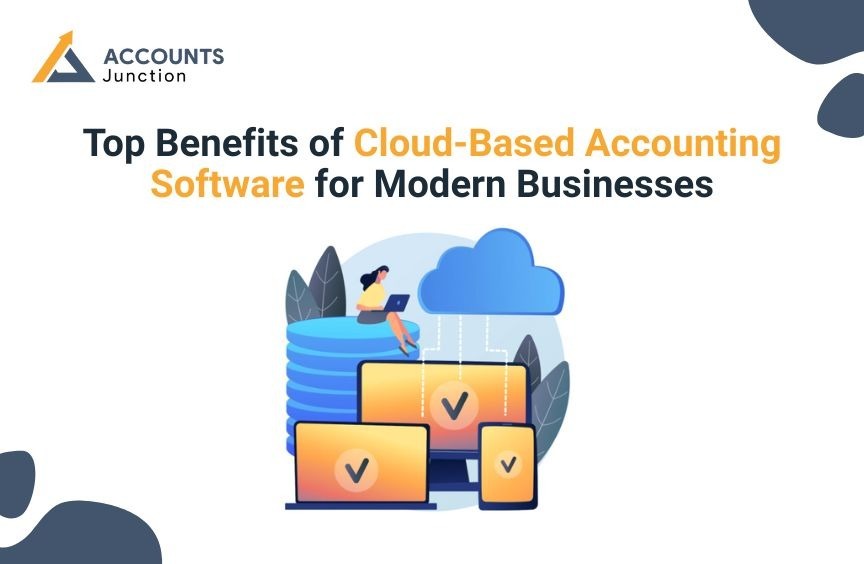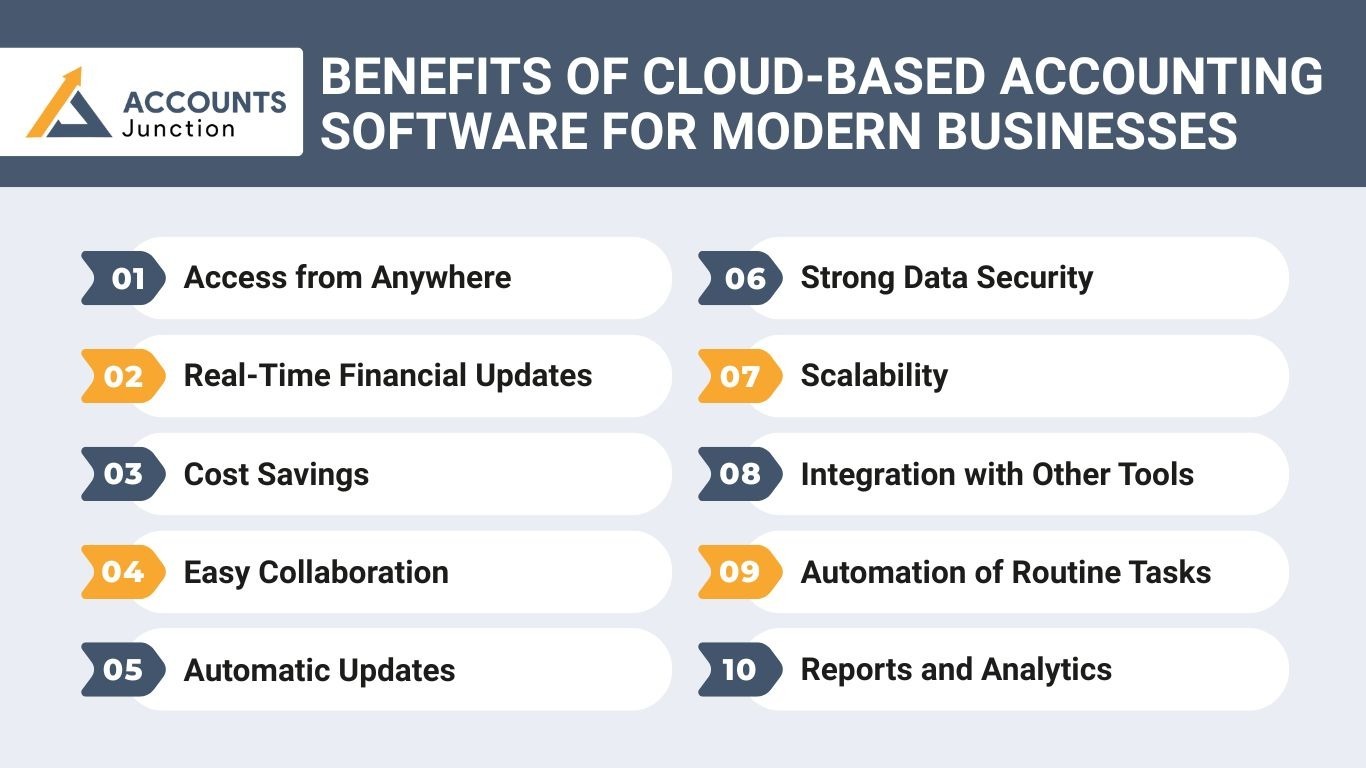
Top Benefits of Cloud-Based Accounting Software for Modern Businesses
Managing money is key for every business. The benefits of cloud-based accounting software help firms handle this work with ease. It lets them track costs, check accounts, and view data quickly. Using cloud accounting software cuts mistakes and saves time, helping businesses grow.
In the modern business environment, companies need fast tools to handle money. Old accounting is slow and often wrong. Cloud solutions let all work be done online, safely, and in real-time. This blog shows the main benefits of cloud-based accounting software and why firms now use it.
Benefits of Cloud-Based Accounting Software for Modern Businesses
1. Access from Anywhere
Cloud accounting lets users check data on any device. One of the main benefits of cloud-based accounting software is the ability to manage accounts anytime, anywhere. This ensures fast decisions and keeps track of finances all the time.
2. Real-Time Financial Updates
Transactions update instantly. You can check balances, track costs, and create reports without delay. Real-time updates lower mistakes and give clear insight into cash flow and income.
3. Cost Savings
Traditional accounting needs servers, licenses, and IT staff. One key benefit of cloud-based accounting software is reduced costs and fewer upfront investments. Cloud software removes these costs. Businesses pay a subscription and get full features without high upfront fees. This suits small and medium-sized firms.
4. Easy Collaboration
Multiple users can work on accounts at once. Managers, accountants, and owners can view records, approve payments, and check reports together. This avoids miscommunication and keeps financial work organized.
5. Automatic Updates
Cloud accounting software updates itself. Users always get the newest version. Security patches, new tools, and rules compliance happen automatically. Data stays safe and systems run smoothly.
6. Strong Data Security
Financial data is sensitive. Enhanced protection is a key benefit of cloud-based accounting software, including encryption, backups, and controlled access. Businesses can protect data from loss or theft. Regular backups ensure data is safe in any case.
7. Scalability
As a business grows, accounting needs grow too. Cloud systems expand easily. You can add users, tools, and storage without installing new software. Growth is smooth and worry-free.
8. Integration with Other Tools
Cloud software can link with payroll, inventory, and CRM systems. A notable benefit of cloud-based accounting software is seamless integration across business tools. This lowers repeated work and keeps records correct across tools. Integration saves time and improves reporting.
9. Automation of Routine Tasks
Tasks like invoicing, bank checks, and expense tracking can run automatically, which is a major benefit of cloud-based accounting software. Automation lowers human error and saves hours of work. Teams can focus on planning and growth instead of repeating work.
10. Reports and Analytics
Cloud tools give reports on income, costs, and cash flow. A big benefit of cloud-based accounting software is clear analytics that help plan budgets and track trends. Clear reports support smart decisions and financial health.
Types of Cloud Accounting Software
- SaaS-Based Software
Works online, paid monthly, simple to grow and scale. Good for small teams needing little IT support. Updates happen automatically without staff doing extra work. - Private Cloud Software
Made for one company, more secure and safe. Best for firms handling sensitive or private financial data. Data can stay local while still using cloud tools. - Hybrid Cloud Software
Mix of online and local systems for more flexibility. Helps firms move systems slowly without causing downtime. Supports both old tools and new online features easily. - Choosing the Right Type
When selecting a solution, understanding your needs highlights the benefits of cloud-based accounting software, ensuring smooth operations for your team. Choosing the right type saves money and time daily. Ensures smooth work and less manual effort overall.
How to Choose Cloud Accounting Software
- Identify Business Needs
Know your needs, like billing, payroll, or stock. Pick features that support your most important daily tasks. Decide which tasks must run automatically or manually. - Check Integration
Check if it links to your current business tools. Linking reduces duplicate work and prevents common mistakes. Make sure software can share data with other systems. - Ease of Use and Mobile Access
Make sure it is simple and works on phones. Software should be easy so staff learn it quickly. Mobile access allows work from anywhere at any time. - Pricing and Trial
Look at prices, fees, and monthly subscription options. Read reviews and try the software before purchasing. Compare options to avoid hidden fees or extra costs. - Customer Support and Training
Good support reduces downtime and helps staff adapt. Training ensures fewer mistakes in daily accounting work. Look for providers offering clear tutorials and guides.
Common Challenges in Cloud Accounting
- Internet Dependency
Needs internet to work and some features fail offline. Slow or weak connections can delay accounting tasks greatly. - Data Security
Data must stay safe with strong passwords and backups. Hackers may try to access accounts without strong protection. - User Adoption
Staff may need help learning how to use software. Training is important to reduce mistakes and save time. - Integration Issues
Old tools may not link; extra apps can help. Sometimes setup or middleware is needed for full connection. - Continuous Updates
Updates come often; staff must learn new features. New features may require process changes or extra training. - Cost Management
Subscription costs can grow with more users or features. Plan budget carefully to cover software and add-ons.
Cloud Accounting Trends in 2025
- AI and Automation
AI tools check numbers and finish tasks on their own. Automation cuts errors and saves staff time each day. - Mobile Apps
Mobile apps let staff work on phones or tablets. They help manage money from any place at any time. - Strong Security
Strong security keeps your business safe from online threats. It adds backups, locks, and two-step login for safety. - Blockchain Records
Blockchain keeps all records safe, clear, and easy to view. It stops fraud and makes sure data stays correct. - Dashboards and Reporting
Dashboards show key info fast for smarter business choices. Reports can be changed to show what matters most. - Cloud Collaboration
Teams can edit files and share work in real time. It helps remote teams track tasks and stay in sync.

How Cloud Accounting Helps Planning
- Cash Flow and Budgeting
Helps predict cash flow and set a simple budget. One of the key benefits of cloud-based accounting software is better forecasting and financial planning. - Expense Tracking
Tracks costs to show where savings are possible clearly. Identify unnecessary spending and improve efficiency of resources. - Real-Time Data
Gives real-time numbers so decisions can be made quickly. Immediate access helps leaders respond faster to all changes. - Goal Setting and Monitoring
Helps set goals and track progress each month clearly. Tracking ensures plans stay on target successfully every time. - Scalable Solutions
Works as your business grows without extra setup needed. Supports new teams, locations, or products easily over time. - Profit Analysis
Shows which products or services are most profitable. Helps focus efforts on high-return tasks for growth.
Cloud Accounting for Small Businesses
- Cost Savings
Reduces need for full-time accountants, saving money monthly. Among the top benefits of cloud-based accounting software is cost efficiency for small businesses. - Automation
Handles all bills, payments, and costs to save time. Cuts mistakes and makes every task quick and easy. - Ease of Use
Staff can run accounts without tech skills or help. The software is clear, simple, and easy to use. - Competitive Advantage
Small firms can now compete with larger firms easily. Cloud tools help businesses stay fair and work well. - Insights for Growth
Gives data to help owners plan and grow smart. Shows clear facts without extra cost or effort needed. - Custom Reports
Makes reports on key numbers fast and clear. Owners can see results quick and make wise choices.
Training and Support
- Tutorials and Guides
Step-by-step guides help staff learn software fast. Clear instructions cut mistakes and build confidence. - Customer Support
Support fixes issues quickly to reduce downtime. Keeps work running smoothly with no delays. - Training
Training cuts errors, so work is faster and correct. Make sure staff can use the software safely. - Ongoing Help
Support keeps software safe and working well. Updates and tips help operations stay steady. - Provider Reliability
Choose a provider with good support to avoid issues. Reliable partners prevent interruptions. - Community Help
Many providers have forums and online groups. Staff can get tips and help from peers fast.
Compliance and Rules
- Tax Tracking
Software tracks taxes on its own to cut filing mistakes. Helps avoid errors and late submissions each time. - Reporting
Makes reports that follow local audit rules. Makes audits and record-keeping simple. - Local Tax Support
Handles local tax rules to file taxes right. Manages VAT, GST, or other local taxes correctly. - Risk Reduction
Cuts the risk of fines by keeping records in order. Helps stay within government rules. - Audit Trails
Keeps all transaction history safe and easy to check. Gives clear records for reviews. - Record Retention
Stores past financial records safely. Useful for audits, reviews, or later reference.
Future of Cloud Accounting
- AI Forecasting
AI tools predict results and make money decisions easy. This is a forward-looking benefit of cloud-based accounting software for smarter financial management. Helps plan cash flow and costs right every time. - Task Automation
Repeats tasks on its own so staff can focus on other work. Cuts manual work and boosts productivity. - Mobile Access
Work from anywhere using phones or laptops. Supports remote teams and flexible schedules. - Data Insights
Gives clear information from data for better business choices. Helps leaders act on facts, not guesses. - Security Improvements
Security gets better all the time, keeping data safe. Updates guard against new risks. - AI Suggestions
Software may suggest steps to improve money health. Helps owners act on time to save more.
Cloud accounting software gives a clear view, speed, and safety. Accounts Junction offers services with live updates, cost cuts, easy teamwork, and growth options. Firms can cut errors, simplify work, and reach data anytime. With certified experts on our team, we deliver correct reports, smooth finance control, and full compliance. Partner with us for smart finance solutions and steady growth.
FAQ's
1. What is cloud accounting software?
- It is a system to manage financial records online.
2. How does cloud accounting help?
- It improves accuracy, saves time, and gives live data access.
3. Is cloud accounting safe?
- Yes, it uses encryption, backups, and access control.
4. Can small businesses use it?
- Yes, it is affordable, scalable, and fits any business size.
5. Does it reduce costs?
- Yes, it removes servers, licenses, and IT maintenance.
6. Can multiple users work at once?
- Yes, many team members can update accounts together.
7. Does it help with taxes?
- Yes, it calculates taxes and ensures compliance.
8. Can it link with other software?
- Yes, it connects with payroll, CRM, and inventory systems.
9. Is training needed?
- Most systems are simple and offer guides and help.
10. Can it work on mobile devices?
- Yes, apps let you access accounts anywhere.
11. Does it support global business?
- Yes, it handles multiple currencies and global standards.
12. How does it improve accuracy?
- Automation and live updates reduce errors in records.
13. Are updates automatic?
- Yes, the provider updates the system regularly.
14. Can it support remote teams?
- Yes, employees can work from any location.
15. How does it help cash flow?
- It gives live data to track payments and costs.
16. Does it grow with the business?
- Yes, you can add users, features, and storage easily.
17. Can it improve decisions?
- Yes, reports and analytics guide financial planning.
